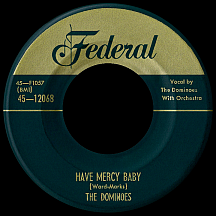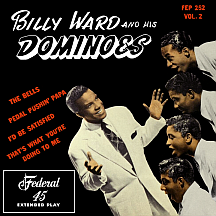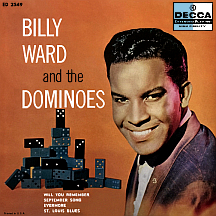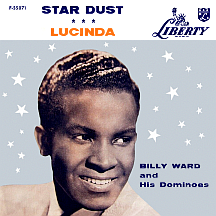BILLY WARD AND
HIS DOMINOES
Intimacy is seldom so precise: a 15-minute prelude, then 15 minutes of this, 15 minutes of that, and one final quarter-hour of 'blowin my top!' This was the disciplined routine floated by songwriters Billy Ward and Rose Ann Marks and delivered by The Dominoes in the smash 1951 hit "Sixty Minute Man," setting a goal for the male species to shoot for. It also moved the bar a notch further in the gradual trend towards more suggestive (but not yet explicit) lyrics in hit songs. But did the message go over most people's heads at the time?
Unlike many other rhythm and blues groups with a first-billed leader, Billy Ward was never the Dominoes' lead singer, nor was he a bandleader per se. He sang with the group but left the lead vocal glories to others, usually the most talented and charismatic singers he could find, or occasionally whoever seemed right for a particular song. Either way, he called all the shots, hired and fired as he saw fit...and as a result was always on the lookout for replacements. Born Robert Lloyd Williams in Savannah, Georgia in 1921, he grew up in Philadelphia. Two things shaped his life's work and personality: playing organ and singing in his church choir served as motivation for a lifetime in music, while his Army service during World War II instilled in him an organized, by-the-rules business sense.
He attended the Chicago Art Institute and also studied at Juilliard in New York City, settling on two professional aliases: Everett William Ward for his songwriting and Billy Ward for everything else. After meeting talent agent Marks, the two formed a long-term partnership as songwriters and in management; by 1948 he had a position as a vocal coach for the Music Guild of Carnegie Hall, where he hand-picked some of his best students, white and black, for a vocal group, calling them the Dominoes to reflect the two colors (much like his partnership with Marks, who was white). Implementing the idea proved difficult, so he modified his objective and hired singers who'd performed around town and others who responded to his newspaper ads, calling this first group The Ques. The original members he hired in the summer of 1950 included three former gospel singers: tenor Charlie White, baritone Joe Lamont and bass Bill Brown. A dynamic 17-year-old vocalist, Clyde McPhatter, who'd made a strong impression on amateur night at Harlem's Apollo Theater, became the lead singer. Billy, who sang and played keyboards, was the fifth member.
After several weeks of practice, the quintet entered the Apollo's amateur show (McPhatter was billed as Clyde Ward, a name that didn't stick for long) and took first place, which led to a spot on CBS-TV's must-see series Arthur Godfrey's Talent Scouts; music arranger Rene Hall took notice and set them up with Syd Nathan of King Records, who wasted no time in signing the quartet to a contract. Reverting to the Dominoes, which everyone seemed to feel was a catchier name, the first single appeared on Nathan's newly-established subsidiary label, Federal. "Do Something For Me," a Ward-Marks composition (as were most of the act's early hits), reached the R&B top ten in February 1951, a bullseye on the first try. Billy was very strict with his singers, establishing curfews, a no drinking policy and other restrictions, and levying fines for breaking the rules. Appearance was important and rehearsals of their singing and stage moves went on relentlessly, though the upside was a professionalism they developed that fans (and hard-to-please critics) appreciated.
According to just about anyone who knew him, label owner Syd Nathan had a fondness for off-color jokes, "adults only" party records and, well, vulgarity in general. So it should come as no surprise that he pushed the envelope (moreso than any record company of the time) with many of the discs he released. Early King Records star Wynonie Harris had a series of double-entendre R&B hits ("I Like My Baby's Pudding," "Lovin' Machine") and Bull Moose Jackson recorded the infamous "Big Ten Inch Record." With "Sixty Minute Man" and its list of boasts by the fictional "Lovin' Dan," the Dominoes toned things down (barely) enough to bypass issues of censorship (though many stations still wouldn't play it); Bill Brown's bass lead was a good fit for the boastful claim of sexual stamina that Nathan figured (or hoped) would be too adult for younger listeners to comprehend. It was an absolute monster, at 14 weeks the longest-running R&B chart-topper of the 1950s; amazingly, it was also a top 30 pop hit, a rarity for an R&B song and absolutely unheard-of for a "dirty" record!
The group's massive hit came in stark contrast to Ward's strictly-enforced anti-horseplay and "no-boozing-it-up" rules. But song content was nothing more than a creative choice and over the next couple of years, recordings alternated between tender ballads and spicier fare. On "Heart to Heart," the Dominoes teamed with Little Esther (who'd left Johnny Otis and Savoy Records, where she'd scored several hits the previous year), then landed their third top ten hit, "I Am With You." The singers had been growing weary of Ward's military-like inflexibility; Charlie White and Bill Brown departed around the end of the year and formed another "game name" group, The Checkers (White had an opportunity to join Atlantic Records' hitmakers The Clovers and eventually did, though not right away). The Checkers began recording for Nathan's other hot label, King. They saw themselves as competition for the Dominoes and gained a following through live shows but never scored a hit record.
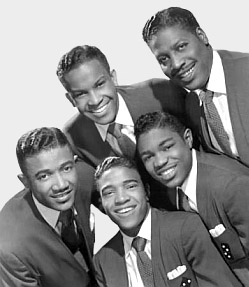
David McNeil, who'd sung bass for The Larks, and James Van Loan signed on while McPhatter continued tackling both uptempo and softer tunes, reaching the R&B top ten with the lively "That's What You're Doing to Me." Then came the hottest of his lead performances on "Have Mercy Baby," a rollicking plea that held the R&B number spot from June to August '52. With five big hits in about 18 months, they challenged the Clovers in the battle for top group in the R&B field. But their leader let it go to his head; billing was changed to Billy Ward and his Dominoes and stayed that way ("his" sometimes replaced by "the") for the remainder of the act's existence. "I'd Be Satisfied" scored late in the year, then 1953 got under way with a headline-grabbing show. A February performance of "The Bells" at Detroit's Fox Theater caused a sensation with fans, who nearly rioted after witnessing Clyde's hysterical handling of the song (crying over his true love, who's lying in a casket: '...baby, please (sob) forgive me...I know I've caused you pain').
McPhatter rebelled for reasons similar to the others; he'd grown tired of Ward's rigid treatment and was frustrated at being underpaid...after all, if he could bring an entire audience to the brink of madness, shouldn't he be better compensated? The two agreed to disagree and Clyde quit. Atlantic president Ahmet Ertegun caught wind of this development and snapped up the singer everyone was talking about, offering to let him start his own group, The Drifters, destined to become one of the greats. "These Foolish Things Remind Me of You," a 1935 song with British origins penned by Jack Strachey, Eric Maschwitz and Harry Link (the first of what would become several classic remakes by the group) was the last Dominoes hit with Clyde as lead in the summer of '53.
Ward moved quickly, making an offer to a Detroit-based singer he'd met months before, Jackie Wilson. The Dominoes leader worked with him on his style and he premiered a few months later as the group's new lead singer. "You Can't Keep a Good Man Down," a fast, edgy tune with a raw, emotional vocal performance comparable to Clyde's sound, was Jackie's first hit with the Dominoes later that summer. Jackie saw himself as a fully-formed singer and showman, ready for major stardom, but he needed smoothing out around the edges. Ward initially had to rein him in; over the course of three and a half years with the Dominoes he emerged as a well-rounded entertainer. "Rags to Riches," a cover of Tony Bennett's fall '53 pop smash, was a hit at the same time for Ward's Dominoes; hitting a high of number three R&B, it was Wilson's most successful song with the group.
For the next couple of years, singles were issued on both labels: ballads and pop covers on King that were targeted for possible pop crossover with the bolder R&B productions on Federal. Besides Ward and Wilson, the mid-'50s Dominoes lineup included Prentice Moreland, previously with hitmaking group The Du-Droppers, former Ink Spots bass Cliff Givens and tenor Milton Merle. There was a drought in '54 and '55 with no singles reaching the charts; Ward took issue with Nathan over what he perceived as a lack of promotional push. He signed the group to Jubilee Records midway through 1954 while still under contract with King and only a few discs were issued; Nathan sued and they were forced to go back and honor the terms of the original contract. In a somewhat desperate move, the group recorded "Can't Do Sixty No More," an answer to their biggest hit (a different song with the same title had been released in '52 by the Du-Droppers, coincidentally during Moreland's time with the act). Like other Dominoes output at the time, the record failed to catch on.
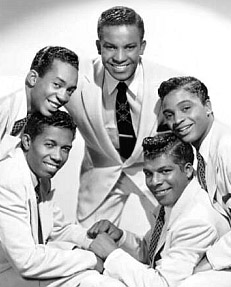
The unexpected death of Rose Marks in June 1955 came as a shock; group members were much more fond of her than Ward. The high times with King-Federal were long past when a deal was worked out with Decca Records. "St. Therese of the Roses," by big band composer Remus Harris and one-time collaborator Arthur Strauss, is a pop ballad at the opposite end of the spectrum from the raunchier Dominoes hits, yet it reached the top 20 of Billboard's sales charts in the spring of '56, becoming Jackie Wilson's first major pop hit. In early 1957, Jackie had an argument with Billy and resigned, then headed back to Detroit and got his solo career rolling with a pair of young, unproven songwriter-producers, Berry Gordy and Billy "Raquel" Davis; "Reet Petite" on Decca-affiliated label Brunswick was his first of several hits with the team, a good start for Gordy, who went on to incredible fame and fortune as the founder of Motown Records. Wilson didn't do so badly either; his string of solo hits took him all the way into the 1970s.
After a year with no hits following "St. Therese," the Dominoes were released by Decca and signed with Liberty, a Los Angeles-based label in its building stages. Suddenly in the market for another lead singer and somewhat unprepared, Ward gambled on the Larks' former lead singer Eugene Mumford, whose vocal sound he felt would be good for pop ballads. Strangely, group members were no longer featured on record covers...just Billy. The 30-year-old Hoagy Carmichael-Mitchell Parish standard "Star Dust" had already been recorded by close to a thousand music acts and the Dominoes' version, with a soaring delivery by Eugene, ranks as one of the best; it was a top 20 pop hit in July 1957 (and their tenth to reach the R&B best sellers). Follow-up "Deep Purple," also with a lead vocal by Mumford, did nearly as well a few months later. Based, perhaps, on the success of these hits, Liberty gave Ward the position of talent director, figuring if he'd been able to work such wonders with singers like McPhatter, Wilson and Mumford, he could find other would-be stars for the label.
The act's final chart single was an odd one, a spring '58 cover of the youthful, upbeat Jan and Arnie hit "Jennie Lee." Ward made some solo recordings for Columbia and Liberty, then he and the group moved to ABC-Paramount for a couple of singles in 1960. Several singers came and went during these years, with Billy the only constant. In November 1962, there was a release on Ro-Zan ("Man in the Stained Glass Window"), a one-off label distributed by King, its name a tribute to Ward's business partner and close friend Rose Ann Marks). He continued touring with various singers as Billy Ward and his Dominoes. The group faded away in the later '60s but retains its status as one of the most important rhythm and blues and early rock and roll acts. Much of the group's notoriety is tied to a single recording: once you've heard "Sixty Minute Man," you can't un-hear it!
NOTABLE SINGLES:
- Do Something For Me - 1951
by the Dominoes - Sixty Minute Man - 1951
by the Dominoes - Heart to Heart - 1951
by Little Esther and the Dominoes - I Am With You - 1951
by the Dominoes - That's What You're Doing to Me - 1952
by the Dominoes - Have Mercy Baby - 1952
by the Dominoes - Love, Love, Love - 1952
by the Dominoes - I'd Be Satisfied - 1952
- I'm Lonely - 1952
- The Bells /
Pedal Pushin' Papa - 1953 - These Foolish Things Remind Me of You - 1953
- You Can't Keep a Good Man Down - 1953
- Rags to Riches - 1953
- Until the Real Thing Comes Along - 1954
- Can't Do Sixty No More - 1955
- St. Therese of the Roses - 1956
as Billy Ward and the Dominoes - Star Dust - 1957
- Deep Purple - 1957
- Jennie Lee - 1958
- You're Mine - 1960
- Man in the Stained Glass Window - 1962
- I'm Walking Behind You - 1965


